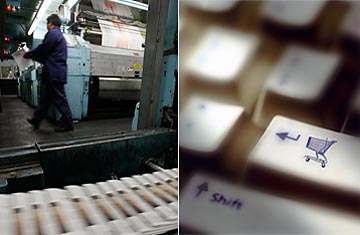
When beleaguered executives from top newspaper companies met at a Chicago airport hotel in late May, they decided they needed a savior — that is, a tech company to help them figure out ways to make money online. Letters inviting solutions went out to 10 companies, and in July the responses discreetly rolled in. Google's proposal inadvertently showed up online Sept. 9, sparking a sea of media reports about Google's plan to save newspapers.
But what of the other companies that contributed ideas, ranging from established powers in the tech world like IBM and Microsoft to such up-and-comers as YouData and Journalism Online?
"There's certainly a potential for one of these companies to become the most popular and dominate the field, and that's particularly true if their technology and business model envisions some kind of a multisite pass," says Rich Gordon, director of digital innovation at the Medill School of Journalism.
Google has an advantage over the other contenders since it already has the technology available. Google's latest proposal entails expanded use of its Checkout product, which currently lets users shop across the Web but sign in in one place. Its newspaper platform would include a similar single sign-on where users could peruse content from different newspapers for one price.
But Google's relationship with newspapers is a bit stressed, mainly because of the way Google News currently distributes newspaper content — effectively diverting readers away from individual news sites by allowing them to scan headlines and story briefs without leaving Google. However, on Sept. 16, Google attempted to mend fences with newspapers by launching Fast Flip, a free news hub that allows readers to scan through participating newspapers, but gives those papers a share of the revenue from ads placed around the site.
Another proposal comes from Journalism Online, a pay-for-news company whose founders include Steven Brill, the former editor of Content, and L. Gordon Crovitz, a former publisher of the Wall Street Journal. The company's proposal would provide an outlet for news from many providers, but would allow them to decide which parts of their content should go behind a pay wall and how much to charge. Unlike Google, however, Journalism Online's platform remains in development. Another proposal from MyWire's Global News Service, owned by Louis Borders (the founder of Borders Books), would also organize content from participating papers behind a pay wall, but it uses existing technology.
Microsoft, the other big-time company that, like Google, already has the technology available to implement a pay wall, also proposes aggregating information from several news sources in one pay-to-play location. The company's proposal emphasizes user preferences and aims to make the content accessible from any device, both on- and off-line. Yahoo is said to be readying an idea as well, but has not yet given any details.
So who will win? Randy Coats, vice president of interactive for Scripps Howard Newspapers, will make the decision for his 13 newspapers. He believes that tech companies that base their proposals on existing tools stand the best chance; Google is the favorite, he adds, because of its proven track record in monetizing online content. "This is way too important for us to be trusting vaporware."
It is hard to tell what payoff would go to the winning technology provider, says Gordon, nor is it even known who would own the content. There is also the question of whether the various pay-for-content ideas would fly with consumers. Google CEO Eric Schmidt recently told British broadcasting executives that charging for online content won't work except for niche and specialist markets. Consumer surveys tend to support those doubts. A Belden Interactive survey released in mid-September found that computer users who said they'd pay for news online would shell out an average of only $4.64 a month, while 47% of the group surveyed said they wouldn't pay anything.
